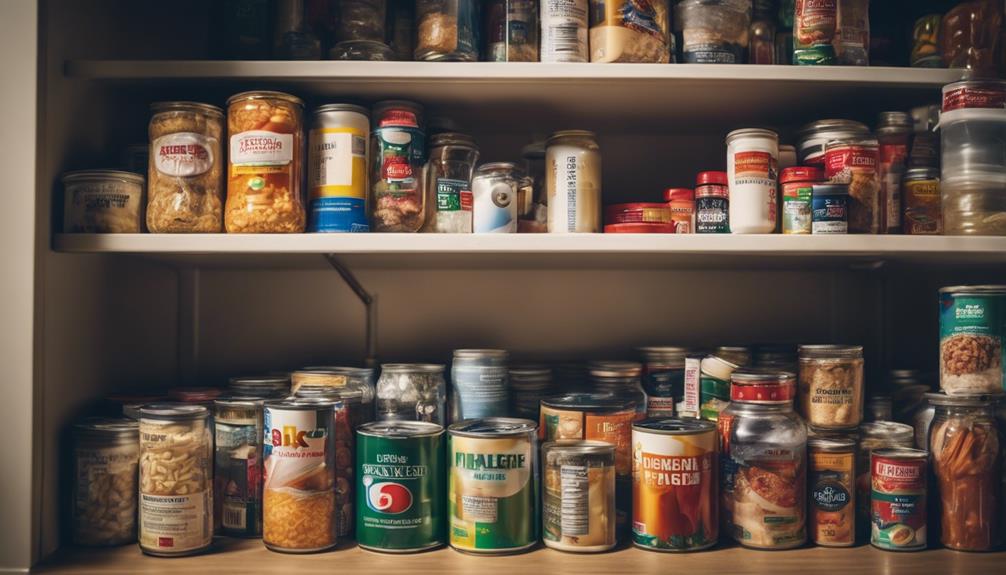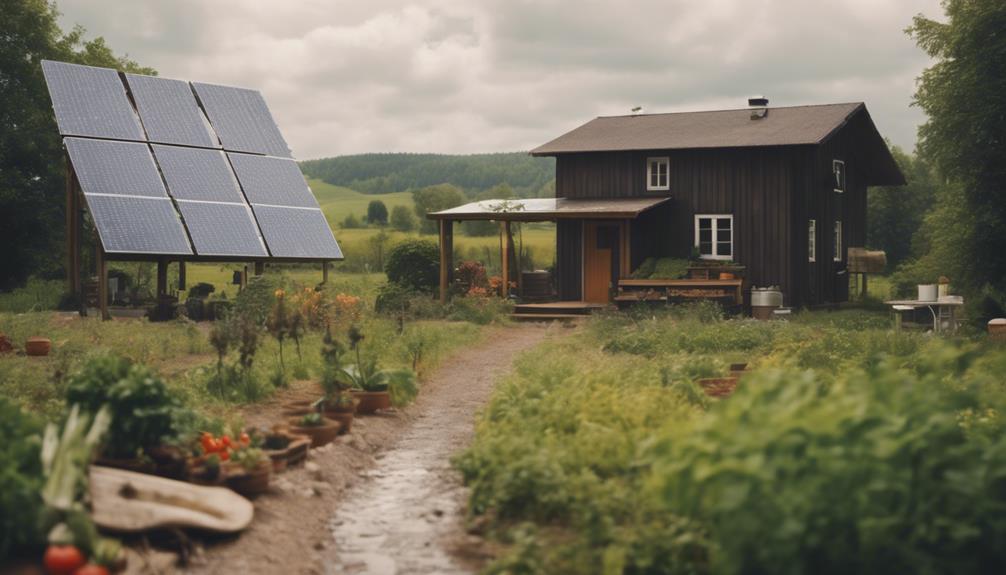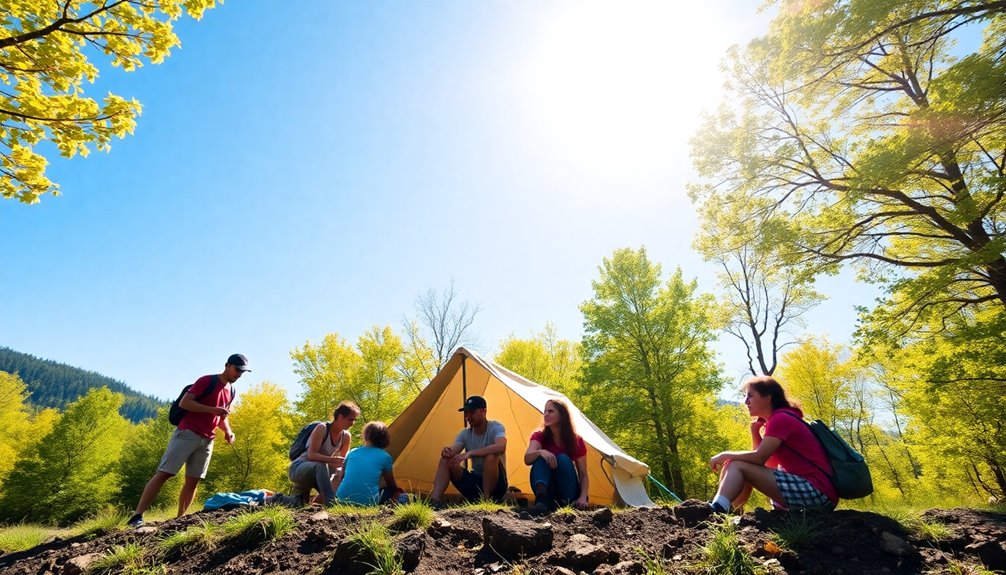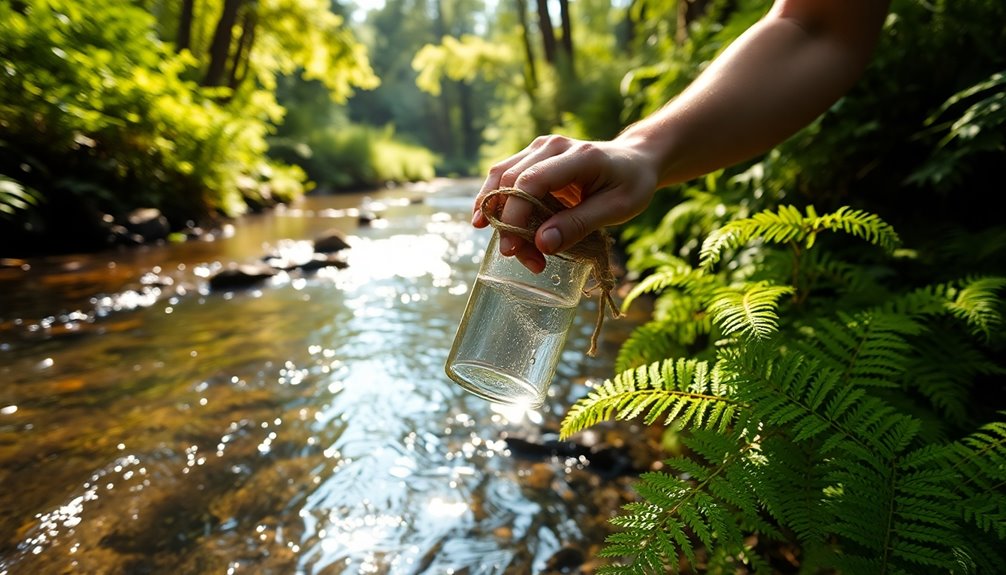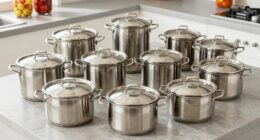Stock up on long-lasting essentials like canned goods, grains, and beans for your preppers food supply. Store them in cool, dry spots in airtight containers. Rotate your stock by using older items first. Include a variety of fruits, veggies, and meats in your pantry. Opt for foods with year-long shelf lives for emergencies. Implement 'first in, first out' rotation and check expiration dates. Properly label containers and monitor storage conditions. Create emergency lists with grains, nuts, and legumes. Enhance your supply with homemade items and diverse ingredients. Stay prepared by following these food supply tips for resilience and readiness. Don’t forget to include high-calorie snacks like peanut butter, dried fruits, and granola in your preppers pantry essentials for added energy during tough times. It’s also wise to stock up on cooking staples like salt, sugar, and oil, as these can aid in food preparation and preservation. Maintaining a well-rounded collection of preppers pantry essentials ensures you’ll be equipped to handle extended emergencies with a balanced diet.
Key Takeaways
- Stock up on long-lasting foods like canned goods, grains, and dried beans for emergency readiness.
- Utilize proper stock rotation methods to ensure fresh supplies and minimize waste.
- Implement effective food storage techniques using airtight containers and proper labeling.
- Create emergency pantry lists with essential items like grains, canned goods, and nuts.
- Enhance food supply with homemade items, diverse ingredients, and culinary skills for meal flexibility.
Essential Pantry Staples
Stock up on essential pantry staples like canned goods, grains, dried beans, and rice to build a well-prepared preppers food supply. Proper food storage is important for maintaining the longevity of these items. Make sure you store canned goods in a cool, dry place away from direct sunlight to prevent spoilage. Consider investing in airtight containers to keep grains and dried beans fresh and free from pests. Remember to rotate your stock by using older items first to maintain freshness and quality.
When selecting canned goods for your survival pantry, opt for a variety of fruits, vegetables, and meats to ensure a balanced diet during emergencies. Check the expiration dates regularly and replace any expired items promptly. Versatile ingredients like beans, legumes, and grains provide essential nutrients and can be used in a variety of recipes. Prioritize stocking foods with long shelf lives, high nutritional value, and versatility to make sure your preppers food supply is well-rounded and sustainable.
Importance of Long-lasting Foods

When considering your preppers food supply, the significance of long-lasting foods can't be overstated.
These shelf-stable items with a year-long shelf life are vital for emergency readiness.
Additionally, their compact storage requirements make them ideal for stocking up on essential sustenance without taking up excessive space.
Shelf Life Benefits
Long-lasting foods with extended shelf lives play an essential role in ensuring food security during emergencies. Having emergency food with a long shelf life in your prepper pantry means you can be well-prepared for unexpected situations.
Shelf-stable foods, when stored correctly, can retain their nutritional value for years, making them a dependable source of sustenance when other options are limited. Understanding the factors that influence shelf life is important for effective prepper pantry stocking.
By investing in foods with extended shelf lives, you reduce the need for frequent replacements, saving both time and resources in the long run. Ensuring your pantry is stocked with items that have a long shelf life not only provides peace of mind but also guarantees readiness for any crisis that may arise.
Storage Space Considerations
Efficient use of storage space is a critical consideration for preppers when selecting long-lasting foods for their emergency pantry. Long-lasting foods with extended shelf life such as grains, beans, and canned goods are essential pantry staples for preppers. These items can last for years when stored properly, offering sustenance during unforeseen situations.
To maximize storage space, opt for compact, nutrient-dense foods that require minimal preparation and come in durable packaging. Choosing items with low moisture content helps prevent spoilage and allows for efficient utilization of limited space. Prioritizing long-lasting foods that can be easily stored in tight spaces guarantees a well-stocked emergency pantry.
Proper Stock Rotation Methods

Guarantee freshness and prevent waste in your prepper pantry by implementing the 'first in, first out' method to rotate food items. Regularly checking expiration dates on canned goods and dry staples is essential to maintaining a reliable food supply.
Create a system to track purchase dates and organize food items based on shelf life, ensuring that items with shorter shelf lives are consumed first. Consider using a spreadsheet or inventory list to monitor stock levels and plan meals around items that need to be used soon.
Training family members on the importance of stock rotation optimizes food storage and minimizes the risk of consuming expired products during emergencies.
Effective Food Storage Techniques

When it comes to effective food storage techniques, proper container selection is key to maintaining freshness and preventing spoilage.
Rotating your stock guarantees that you always have fresh supplies on hand when you need them.
Controlling the temperature in your storage area can also help prolong the shelf life of your emergency food items.
Proper Container Selection
For important food storage techniques, select airtight containers made of materials like glass, metal, or heavy-duty plastic to maintain the quality and freshness of your stored items. These containers help prevent air, moisture, and pests from affecting your food, vital for survival situations.
When storing bulk items such as grains, beans, and flour for an extended period, consider using Mylar bags or food-grade buckets with tight lids. Opt for opaque containers to shield your food from light exposure, which can degrade quality and reduce shelf life.
Vacuum sealing food in bags or jars is another effective method to remove oxygen, thereby prolonging freshness and preventing spoilage in your pantry. Remember to label your containers with contents and storage dates. This simple step will help you easily track inventory, rotate stock, and make sure that food is used before expiration, contributing to a well-prepared food supply.
Rotation for Freshness
Wondering how to maintain the freshness of your stored food supplies effectively? Proper rotation for freshness is key to guaranteeing your emergency food stock remains viable.
Here's how you can keep your supplies in top condition:
- Rotate by 'first in, first out': Use older items before newer ones to prevent food from expiring.
- Check expiration dates: Regularly review dates and consume items nearing expiration first.
- Prioritize proper rotation: Maintaining the order of items helps preserve their nutritional value and taste.
- Diversify food categories: Ensure a balanced diet by rotating through different types of stored foods.
Temperature Control Methods
To maintain the freshness and quality of your preppers food supply, implementing effective temperature control methods is essential. Proper temperature control plays a significant role in extending the shelf life of your stored items and preventing food spoilage. Storing food in cool, dark areas, and avoiding temperature fluctuations, heat, or sunlight are key practices to follow. Consider refrigerating or freezing perishable items to prolong their longevity in your prepper pantry. Monitoring storage areas for consistent temperatures and using thermometers to maintain ideal conditions are vital steps to guarantee the safety and quality of your stored foods.
| Temperature Control Methods | Benefits |
|---|---|
| Store in cool, dark areas | Prolongs shelf life |
| Avoid temperature fluctuations | Prevents food spoilage |
| Refrigerate or freeze perishable items | Extends longevity |
| Monitor storage temperatures | Ensures safety and quality |
| Use thermometers in storage spaces | Maintain ideal conditions |
Creating Emergency Pantry Lists

Consider including a variety of shelf-stable foods with long shelf lives when creating your emergency pantry list. To guarantee you have a well-rounded selection of non-perishable foods, here are four essential items to include:
- Canned goods such as vegetables, fruits, and proteins for a quick and easy meal solution.
- Grains like rice, quinoa, and pasta that can be stored for extended periods and provide essential carbohydrates.
- Dried beans and legumes, rich in protein and fiber, offering versatility in meal preparation.
- Nutritious nuts and seeds packed with essential fats and minerals, ideal for snacking or adding to meals for extra nutrients.
Building a Resilient Food Supply

When you aim to fortify your readiness for unforeseen circumstances, establishing a resilient food supply becomes a cornerstone in your emergency preparedness plan. To guarantee your Food Supply is well-equipped for any situation, focus on stocking up on survival food with long shelf-life.
Consider including pantry staples like grains, beans, canned goods, and dried fruits, which can sustain you during emergencies. Proper storage techniques such as using airtight containers, rotating your stock, and monitoring expiration dates are essential for maintaining a reliable food stockpile.
Diversify your options by including seeds, nuts, trail mixes, and baking essentials to provide both nutritional variety and flexibility in meal preparation. Additionally, creating emergency pantry lists, meal plans, and readiness guides can help you stay organized and prepared for unexpected situations.
Don't forget to enhance your food supply with homemade items like sourdough starter, extracts, and alternative ingredients to boost culinary skills and prolong the longevity of your emergency provisions.
Foods to Avoid or Store Sparingly

Minimize storing foods high in moisture content like fresh fruits and vegetables due to their shorter shelf life.
When building your preppers food supply, it's important to avoid certain items that may not withstand long-term storage.
Consider the following tips to make sure your provisions stay fresh and ready for consumption:
- Store perishable items sparingly to prevent spoilage and the need for refrigeration.
- Consume foods with high oil content, such as nuts and seeds, within their recommended storage time to avoid rancidity.
- Avoid storing foods with strong odors to prevent them from impacting the taste of other pantry items.
- Limit the storage of foods with delicate textures as they may not retain their quality over extended periods.
Frequently Asked Questions
What Food Do Preppers Stock up On?
You stock up on a variety of foods like rice, beans, canned goods, and dried fruits. Don't forget non-perishable proteins such as canned meats, tuna, and jerky. Dairy alternatives, nuts, seeds, and baking essentials are also essential for emergencies.
What Foods to Stock up on for Long Term Storage?
When considering foods for long term storage, focus on shelf-stable options like grains, proteins, and fruits with a year-long shelf life. Opt for space-efficient, nutrient-dense items that cater to nutritional needs and ease of preparation.
What Are the Best Non-Perishable Foods to Stock up On?
When prepping, think beyond the expiry date. Canned goods, dried foods, nuts, and seeds make the cut for your pantry. Don't forget about powdered milk and eggs plus shelf-stable proteins. Stay ready!
What Is the Best Canned Food to Stockpile?
When preparing for emergencies, the best canned food to stockpile includes meats like chicken and tuna for protein, vegetables such as corn and peas for nutrients, and fruits like peaches and pears for vitamins. Choose wisely!
Conclusion
In summary, stocking up on essential pantry staples is vital for staying prepared in times of need.
Did you know that the average American household only has a three-day supply of food on hand?
By following proper stock rotation methods, effective food storage techniques, and creating emergency pantry lists, you can build a resilient food supply to guarantee you have what you need when you need it.
Stay prepared and stay safe!

